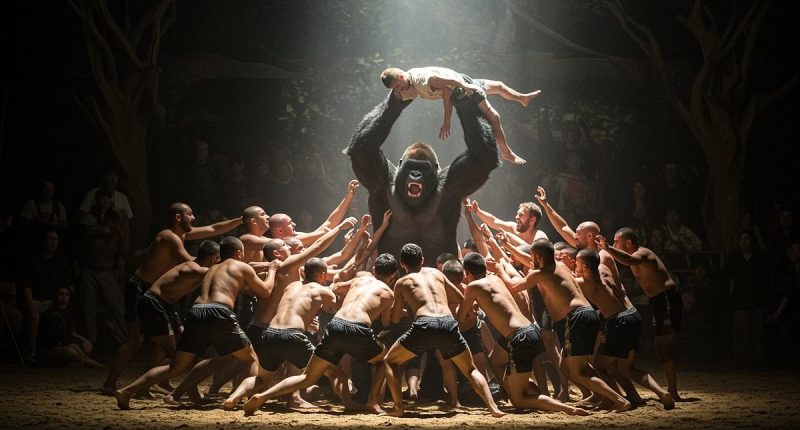Share this @internewscast.com
World heavyweight boxing champion Oleksandr Usyk didn’t hesitate. Asked whether he would win a boxing match with a silverback mountain gorilla, he just said: ‘Yeah, yeah.’
During an interview on TalkSPORT yesterday, the 38-year-old Ukrainian fighter went further still: his ten-year-old son Mykhailo could do it with his judo skills. At a pinch, 12-year-old big brother Kyrylo might step in to help.
Bizarre as it seems, the question is one that has been provoking heated discussion all over the world this week – at least, that portion of the planet prone to obsession with controversies on the internet.
More than 288million people have joined the online debate after a user called DreamChasnMike on the social media forum X suggested that it would take 100 ‘dedicated’ humans to overpower one gorilla.
The Mail prefers not to quote the exact phrasing of this controversial statement, since it is spattered with unprintable language. But here is the gist of it: take one disgruntled primate (subspecies Gorilla beringei beringei) and pit it against a regiment of unarmed men and women. If that regiment numbers fewer than 100, the gorilla will win.
This reckless assertion caused such differences of opinion that the most popular figure on YouTube, the aptly named Mr Beast, who has 386million followers, offered to put it to the test.
Mr Beast, alias 26-year-old Jimmy Donaldson from Wichita, Kansas, joked: ‘Need 100 men to test this, any volunteers?’
One of those who stepped forward was the owner of X, Elon Musk, who replied: ‘Sure, what’s the worst that could happen?’
Some took the question more seriously. One X user said, ‘100 people could literally sit on a gorilla and kill it.’

More than 288million people have joined the online debate on X after a user called DreamChasnMike suggested that it would take 100 ‘dedicated’ humans to overpower one gorilla – as in this AI generated image
‘A group acting together would surround and grapple,’ suggested another. ‘Wrapping around arms, legs, head, gouging eyes, etc.’ But he added a caveat: ‘You can’t punch a gorilla one by one. A punch isn’t going to win it.’
Another went further still: 100 humans could overpower not merely a gorilla but an elephant. He used advanced mathematics to prove his point: ‘100 people equals 400 hands and feet,’ and added, ‘Humans used to hunt woolly mammoths.’
Others were more sceptical.
One said: ‘No matter how dedicated you are… all 100 of you will meet your maker after a very violent and vicious death… May God be with you all… I won’t be joining in unfortunately.’
And another predicted that one gorilla could, in theory, kill every human on the planet: ‘When standing, only three attackers are within reach. If you can continually fight off three, you can defend against an infinite number.’
In the interests of promoting reasoned discourse, the social media team at Encyclopaedia Britannica posted a ‘100 Men vs. 1 Gorilla Study Pack’, featuring anatomical data on bone strength and muscle power.
This intervention did not noticeably raise the standard of debate. Replying to the encyclopaedia, one X user: ‘My money is on the humans retreating once the ape rips a couple of guys’ arms off and slaps them silly with them.’
We’re unlikely to see a definitive resolution any time soon. This question was originally posted on the discussion forum Reddit five years ago, and variations have been floating around since the birth of the World Wide Web.
For instance, in 2013, one Reddit user asked: ‘How many five-year-olds could you take if they all swarmed you at once?’ That question also divided the internet, though many parents of primary school children were able to give a definitive answer: it only takes one well-motivated five-year-old to reduce most adults to jelly.
Stupid questions can provoke the cleverest answers. John Drury, professor of social psychology at the University of Sussex, told the Mail that the viral gorilla debate touched on interesting areas of human behaviour, such as cowardice and self-preservation.

With one hand, a silverback can exert a grip force of 1,300lb, enough to mulch a human skull like a ripe mango
‘Individuals would take the risk of joining in with others in the fighting, on the assumption that others would be doing the same,’ he suggested. ‘But how do they know what others intend to do? That’s the dilemma.’
Professor Drury compared it to the ‘free rider problem’, a socio-economic phenomenon where the selfishness of individuals damages everyone’s best interests, including their own. For instance, a subsidised community bus service might go out of business if too many people dodged the fare.
Psychologists have discovered the best defence against free riders is to promote a sense of collective responsibility, underpinned by a social contract. In other words, when everybody shares a sense of duty to each other, we have a society where everyone pays for their ticket and no one needs to lock the front door. Older readers might remember when Britain was more like this.
When it comes to fighting gorillas, or any sort of war for that matter, collective responsibility and trust in each other is crucial. That’s why the ‘Pals’ battalions in the First World War, men recruited from the same streets, factories and even football clubs, fought so bravely shoulder to shoulder.
‘Team spirit is based on shared identity,’ said Professor Drury, ‘and yes, it can lead to self-sacrifice. If we share social identity with fellow group members, individuals tempted to hold back could be more reluctant to do so, as they might feel more commitment to the group (and more guilt about not pulling their weight).’
But when people are strangers, there is less likelihood that they will risk their lives for each other. Compare the improbable situation of a mass brawl involving a gorilla to a hijack on an airliner.
One terrorist with a gun can subdue scores of passengers, because even though they could overpower the gunman with a mass attack, none of them is eager to take the first bullet.
Gorillas don’t carry guns, but they are many times stronger than us. With one hand, a silverback can exert a grip force of 1,300lb, enough to mulch a human skull like a ripe mango. And they can lift up to ten times their own bodyweight – enough to hoist 20 average men into the air with a single movement.

I also believe I could subdue a gorilla, provided I was armed with my secret weapon: a tube of Pringles, Christopher Stevens writes
All this, however, misses the crucial fact that gorillas are peaceable animals. Unlike chimps, which often behave aggressively to each other, and certainly unlike humans, they rarely fight.
Veteran wildlife cameraman Gordon Buchanan, who spent months in the Congo rainforest filming a gorilla family in 2015, told me: ‘A silverback always looks grumpy, because he has the weight of the world on his shoulders.
‘But the truth is, despite their reputation as big, scary King Kongs, gorillas spend most of their lives in harmony. They’re the hippies of the forest, never happier than when they’re chilling out.’
Mostly vegetarian, they eat green shoots and fruit. Bamboo is a delicacy. Western lowland gorillas have a particular taste for insect larvae and will break open a termite mound to eat the grubs, which are rich in protein.
Mountain gorillas need to consume up to 75lb of veg daily, which doesn’t leave a lot of time for fighting. The males make kind fathers, and have been observed playing patiently for hours with their infants. They are also gravely endangered, with fewer than 1,100 left in the wild.
For the record, like Usyk, I also believe I could subdue a gorilla, provided I was armed with my secret weapon: a tube of Pringles.
According to Andre Bauma, a conservationist in Africa’s oldest national park, Virunga in the Democratic Republic of the Congo, gorillas will do anything for a fistful of the salty snacks. ‘We do not give it to them as food,’ Andre says, ‘but rather as a tactic to control them.’
The weight of expert evidence, then, is all on the side of the humans. Gorillas are not naturally aggressive, as Mr Buchanan emphasises. They can be easily bribed with Pringles. And most importantly of all, as Professor Drury explains, when humans co-operate and stick to a plan, our collective strength far outstrips the sum of our individual abilities.
The question is answered. Humans win, every time. But how much better it will be if we pour our ingenuity and effort, not into fighting them, but into saving them from extinction.




